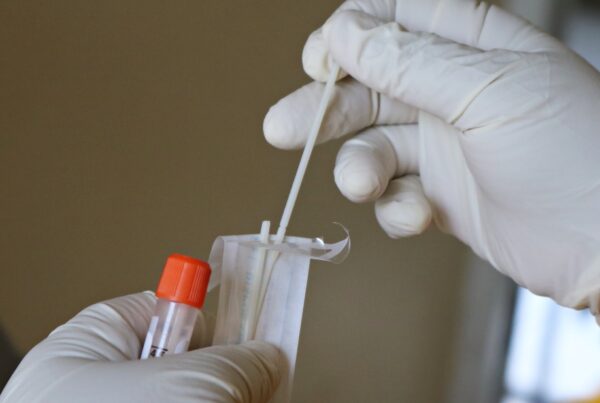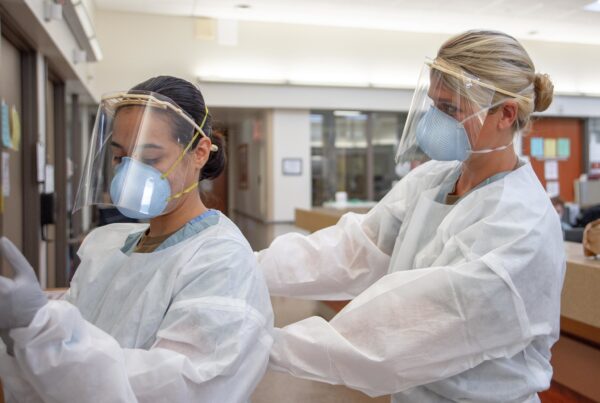The Big Picture
An update on the number of cases and deaths from COVID-19: As of Sunday, December 20, the United States has over 17.5 million reported coronavirus cases and 315,000 deaths. North Dakota, South Dakota, and Wisconsin maintain the highest case rates (cases per 100,000 people), as the midwest continues to see high case levels. At the same time, the west coast is seeing unprecedented surges. LA County USC Medical Center (one of the largest hospitals in the state) others in California have reached ICU capacity. Patients are waiting hours to receive care as California activates its “mass fatality: program. The dire situation in California comes as people across the country crowd indoors for last-minute shopping or get ready to travel for the holidays.
A Push to Use the DPA to Address PPE Crisis
As the country prepares for a new administration to enter the White House, healthcare experts are calling on the Biden administration to stay more engaged with the PPE crisis, than the current administration. While the vaccine has provided a ray of hope for many, it has also overshadowed the worsening PPE crisis. Chris Rubesch, a cardiac nurse, explained that the N95 masks that he and his colleagues are wearing for weeks sag after a few shifts, leaving gaps between the mask and one’s face. Kathy Haff, a registered nurse at Community First Medical Center in Chicago, said many healthcare workers are being given masks that don’t fit, and she blames the death of three nurses in her hospital on a lack of PPE. She stated, “Things are going to get worse before they get better, especially if we don’t have enough P.P.E.”
While increasing shortages are being attributed to spikes in global demand and strain on the supply chain system, many healthcare experts are saying the current administration’s “hands-off approach” has contributed to the shortage. A lack of federal action has forced states and hospitals to compete for supplies, much of which is subject to price gouging. Furthermore, many are blaming the limited use of the Defense Production Act (DPA), which can support federal distribution of scarce goods. Particularly, the DPA can provide grants to companies to produce PPE, and force companies to focus on government needs over private ones. Throughout the campaign process, Biden promised to take full advantage of the DPA, and the medical community is now calling on him to fulfill that promise. Doing so would increase the production of PPE, test kits, vaccines, and other medical supplies. Further, it can help end profiteering and price gouging. Stanley M. Bergman, chief executive of medical gear distributor Henry Schein, urges, “This is not a time for complacency from the federal government. We need bold action.”
This comes as the need for nitrile gloves and masks rises. Costing $30 per case before the pandemic, nitrile gloves now cost $300 per case. Data from Get Us PPE shows that the number of requests for PPE in December so far has gone up 105% since this time in November. Eighty-nine percent of surveyed healthcare workers state they are reusing single-use masks.
Dr. Bright, former director of the Health and Human Services Biomedical Advanced Research and Development Authority, expresses optimism that the incoming administration will find ways to create a federal system for testing supplies and PPE and prioritize American companies producing medical gear. Other experts state that the only way to reduce the PPE crisis is to recognize it as a threat to national security. The New York Times reports “that could mean providing loans and subsidies to domestic companies, mandating that states and national stockpiles acquire American-made medical products, and perhaps requiring hospital chains to source some of their supplies from homegrown manufacturers.”
$7 Billion Spent on PPE
The Associated Press released data showing that states spent more than $7 billion in PPE this spring. Gathering this data became difficult as the AP found many states had little transparency around what purchases were being made and from what companies PPE was being purchased. Furthermore, it revealed that states were paying businesses for PPE that had never sold PPE before the pandemic, alluding to the increase in black market PPE purchases. While states are still spending millions on PPE, the initial panic to purchase equipment has subsided.
This Week at Get Us PPE
Dr. Shikha Gupta, executive director of Get Us PPE was featured in Yahoo News regarding the PPE shortages in non-hospital facilities. She explained that: “Big hospitals, well-funded facilities with buying power, are doing okay. The problem is worst in non-hospital facilities- independent clinics, rural providers, nursing homes, homeless shelters. Those are the groups that are struggling. There’s no central place for them to find suppliers and supplies that have been vetted.”
Dr. Megan Ranney and Dr. Esther Choo, co-founders of Get Us PPE, co-authored an article in CNN, expressing their trust for the COVID-19 vaccine. Dr. Ranney stated, “Vaccines are, perhaps, the greatest miracle of modern medicine. Over the past century, they have had a major role in transforming the life expectancy of the global population, thanks to the acceptance, rather than skepticism, of the general public. And they will continue to help us if we let them.” Dr. Choo and Dr. Ranney explained that the similar success rate (over 90%) of both Pfizer’s and Moderna’s vaccine is reassuring. Furthermore, the known side effects of the vaccine are “neither dangerous nor long-lasting.” Both doctors explain that this vaccine is not a cure, but it is a chance to provide a safer environment for everyone. They also describe the devastation that frontline workers witness every day, and urge everyone to trust the vaccine.
Dr. Ranney contributed a touching quote to InStyle in response to the release of ‘Epiphany’, a track from Taylor Swift’s new album folklore. Written about healthcare workers during the pandemic, this song draws parallels between Swift’s grandfather’s time during World War II and the hardship frontline healthcare workers are facing. Dr. Ranney said, “It was just another beautiful T.Swift touch…But what mattered most was that it gave us freedom to feel. The first time I heard it, I started crying.”




